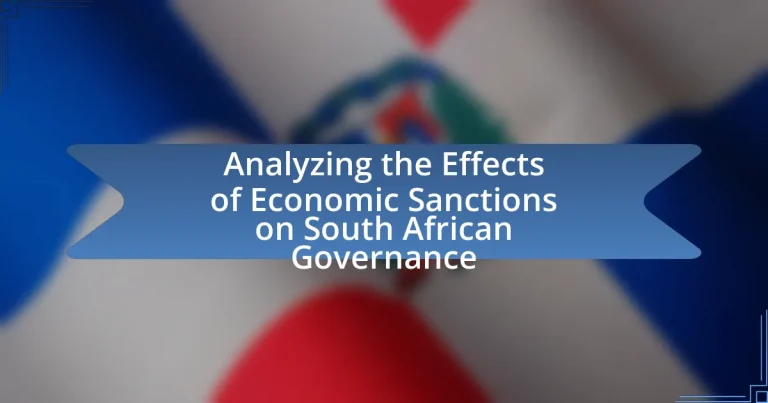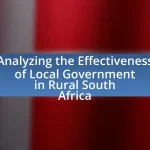Economic sanctions are restrictive measures imposed by countries or international organizations to influence the behavior of a target nation, particularly in response to violations of international law or human rights abuses. This article analyzes the effects of economic sanctions on South African governance, focusing on their historical context during the apartheid era, the mechanisms through which they exert influence, and their impact on political stability, economic performance, and civil society. It also examines the types of sanctions imposed, the differences between unilateral and multilateral sanctions, and the lessons learned from past experiences, providing insights into strategies for mitigating the effects of sanctions and strengthening resilience against future economic pressures.
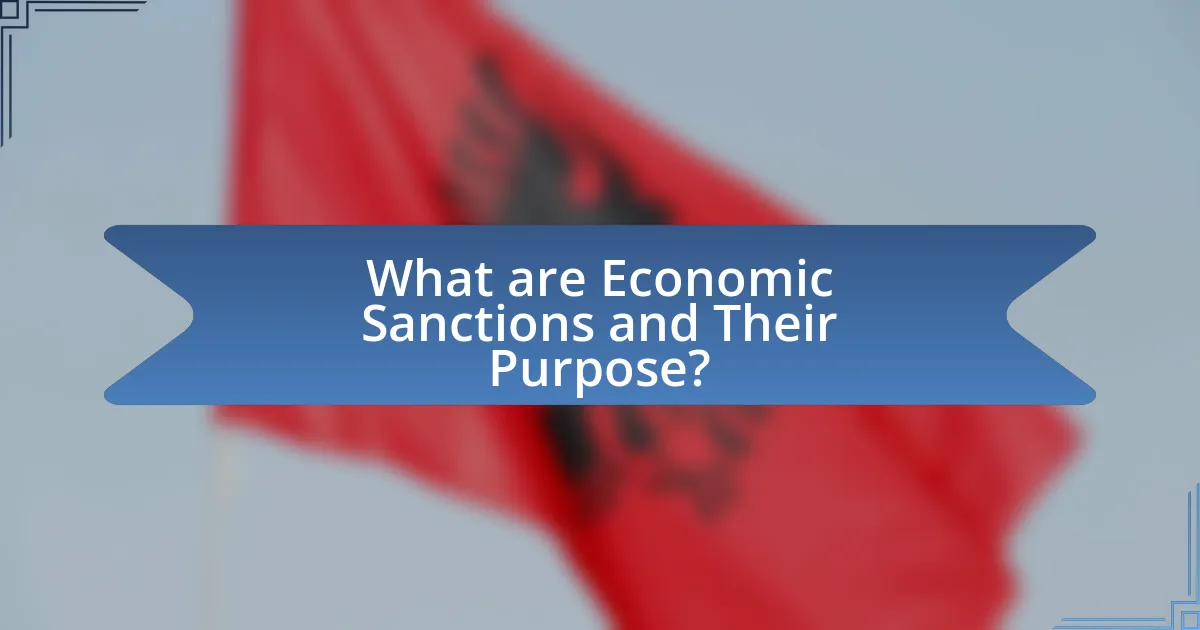
What are Economic Sanctions and Their Purpose?
Economic sanctions are restrictive measures imposed by countries or international organizations to influence the behavior of a target nation, often in response to violations of international law or human rights abuses. Their primary purpose is to coerce the target into changing specific policies or actions, thereby promoting compliance with international norms. For instance, the United Nations has implemented sanctions against countries like South Africa during apartheid to pressure the government to end racial segregation, demonstrating the effectiveness of sanctions in altering governance and policy.
How do Economic Sanctions Affect Governance?
Economic sanctions significantly impact governance by undermining state authority and exacerbating economic instability. When a country faces sanctions, its government often struggles to maintain public services and economic growth, leading to decreased legitimacy and increased public discontent. For instance, in South Africa during the apartheid era, international sanctions aimed at the government resulted in economic decline, which weakened the ruling party’s control and fueled opposition movements. This historical context illustrates how sanctions can catalyze political change by diminishing the effectiveness of governance and prompting shifts in power dynamics.
What mechanisms do sanctions use to influence government behavior?
Sanctions influence government behavior primarily through economic pressure, diplomatic isolation, and signaling. Economic sanctions restrict access to financial resources, trade, and investment, compelling governments to alter policies to alleviate economic hardship. For instance, the imposition of trade embargoes can lead to significant revenue losses, prompting governments to reconsider their actions to restore economic stability. Diplomatic isolation reduces a government’s ability to engage with other nations, limiting its influence and support on the global stage, which can pressure leaders to change their behavior. Additionally, sanctions serve as a signal to both the targeted government and the international community, indicating disapproval of specific actions, which can lead to domestic and international pressure for change. Historical examples include the sanctions against South Africa during apartheid, which significantly contributed to the eventual dismantling of the regime due to both economic and political pressures.
How do sanctions impact political stability in South Africa?
Sanctions negatively impact political stability in South Africa by exacerbating economic challenges and increasing social unrest. The imposition of sanctions often leads to reduced foreign investment and trade, which can result in higher unemployment rates and inflation. For instance, during the 1980s, international sanctions against the apartheid regime contributed to economic decline, leading to widespread protests and political instability. Additionally, sanctions can create a perception of external interference, which may rally nationalist sentiments but also deepen divisions within society, further destabilizing the political landscape.
What Types of Economic Sanctions are Imposed on South Africa?
Economic sanctions imposed on South Africa primarily include trade restrictions, financial sanctions, and arms embargoes. Historically, during the apartheid era, the United Nations and various countries implemented comprehensive sanctions aimed at isolating the South African government due to its racial policies. These sanctions included bans on the export of certain goods, restrictions on financial transactions, and prohibitions on arms sales. For instance, the UN Security Council Resolution 418 in 1977 imposed an arms embargo, which was a significant measure against the apartheid regime.
What are the differences between unilateral and multilateral sanctions?
Unilateral sanctions are imposed by a single country against another, while multilateral sanctions are enacted by multiple countries collectively. Unilateral sanctions often reflect the political or economic interests of the imposing nation and can be implemented without international consensus, as seen in the United States’ sanctions against Iran. In contrast, multilateral sanctions require cooperation among several nations, typically coordinated through international organizations like the United Nations, which enhances their legitimacy and effectiveness, as demonstrated by the sanctions imposed on South Africa during apartheid.
How do trade sanctions differ from financial sanctions?
Trade sanctions restrict the exchange of goods and services between countries, while financial sanctions limit access to financial systems and assets. Trade sanctions often target specific industries or products, such as arms or oil, to influence a nation’s economic behavior. In contrast, financial sanctions can include asset freezes, restrictions on banking transactions, and prohibitions on investments, directly impacting a country’s financial stability and ability to conduct international trade. For example, the United States imposed trade sanctions on Iran to curb its nuclear program, while simultaneously implementing financial sanctions to restrict its access to global financial markets.
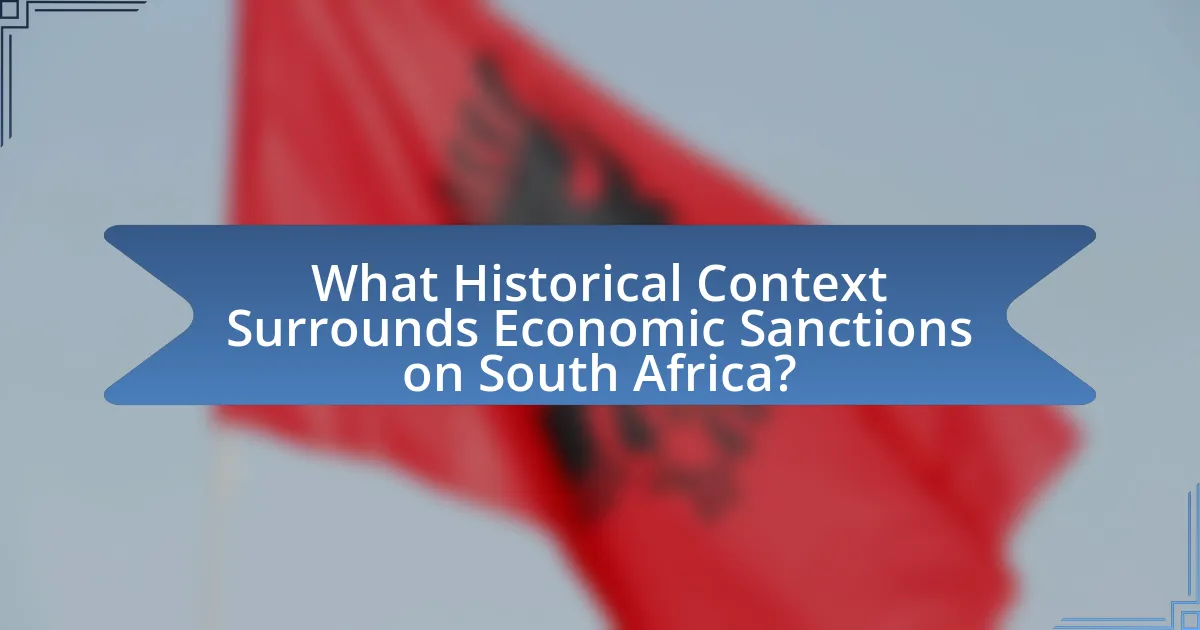
What Historical Context Surrounds Economic Sanctions on South Africa?
Economic sanctions on South Africa were primarily a response to the country’s apartheid policies, which enforced racial segregation and discrimination from 1948 until the early 1990s. The international community, including the United Nations, imposed sanctions in the 1980s to pressure the South African government to dismantle apartheid. These sanctions included trade restrictions, financial disinvestment, and cultural boycotts, aimed at isolating the regime and supporting anti-apartheid movements. The effectiveness of these sanctions is evidenced by the eventual negotiations that led to the end of apartheid and the establishment of a democratic government in 1994, marked by Nelson Mandela’s election as president.
How have past sanctions shaped South African governance?
Past sanctions have significantly shaped South African governance by compelling the government to transition from apartheid to a democratic system. The imposition of international sanctions in the 1980s, including trade embargoes and financial restrictions, pressured the apartheid regime to negotiate reforms. This culminated in the release of Nelson Mandela in 1990 and the subsequent dismantling of apartheid laws. The 1994 democratic elections, which marked the end of decades of racial segregation, were a direct result of the internal and external pressures created by these sanctions. The economic isolation forced the government to reconsider its policies and engage in dialogue with opposition groups, ultimately leading to a more inclusive political framework.
What were the key sanctions during the apartheid era?
The key sanctions during the apartheid era included economic, cultural, and military measures imposed primarily by Western nations and international organizations. Economic sanctions involved trade restrictions, such as the United Nations arms embargo in 1977, which prohibited the sale of weapons to South Africa, and financial sanctions that limited access to international loans and investments. Cultural sanctions included the boycott of South African sports teams and artists, significantly isolating the country from global cultural events. Additionally, the Comprehensive Anti-Apartheid Act of 1986, enacted by the United States, imposed further economic sanctions, including restrictions on imports and investments, which aimed to pressure the South African government to dismantle apartheid policies. These sanctions collectively contributed to economic decline and increased internal resistance against the apartheid regime.
How did the end of apartheid change the landscape of sanctions?
The end of apartheid significantly altered the landscape of sanctions by leading to the lifting of economic restrictions imposed on South Africa. Following the dismantling of apartheid in the early 1990s, international sanctions that had been aimed at pressuring the South African government to end racial segregation were removed, allowing for increased foreign investment and trade. For instance, the United Nations and various countries had enacted comprehensive sanctions, including trade embargoes and financial restrictions, which were lifted after Nelson Mandela’s release in 1990 and the subsequent democratic elections in 1994. This transition facilitated South Africa’s reintegration into the global economy, resulting in a surge of economic growth and development.
What Current Economic Sanctions are in Place Against South Africa?
Currently, there are no comprehensive economic sanctions imposed against South Africa by major international bodies such as the United Nations, the European Union, or the United States. Historical sanctions were lifted in the early 1990s following the end of apartheid, and since then, South Africa has maintained a stable relationship with these entities. The absence of current sanctions is evidenced by South Africa’s active participation in global trade and its membership in organizations like the BRICS group, which includes Brazil, Russia, India, China, and South Africa.
What are the reasons behind the current sanctions?
The current sanctions are primarily imposed due to concerns over human rights violations and corruption within the South African government. These sanctions aim to pressure the government to improve its governance practices and uphold democratic principles. For instance, international bodies have cited specific incidents of state-sponsored violence and systemic corruption as justifications for these measures, highlighting the need for accountability and reform in South Africa’s political landscape.
How do these sanctions affect South Africa’s international relations?
Sanctions negatively impact South Africa’s international relations by isolating the country from key trading partners and diminishing its diplomatic influence. For instance, sanctions imposed due to South Africa’s stance on various geopolitical issues have led to strained ties with nations that prioritize economic cooperation, such as the United States and European Union. This isolation can result in reduced foreign investment and trade opportunities, as evidenced by a decline in bilateral trade volumes with sanctioning countries. Furthermore, South Africa’s ability to participate in international forums and negotiations is compromised, limiting its role in global governance and regional stability initiatives.
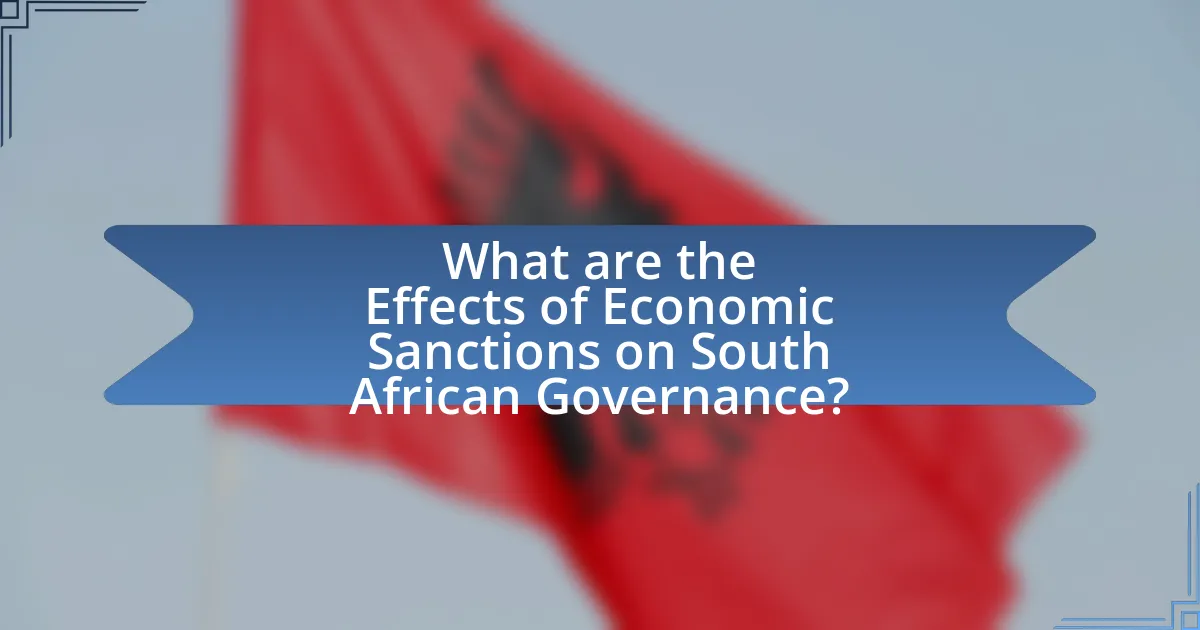
What are the Effects of Economic Sanctions on South African Governance?
Economic sanctions have significantly impacted South African governance by constraining economic growth and limiting government resources. These sanctions, particularly during the apartheid era, led to reduced foreign investment and trade, which weakened the government’s financial capacity to address social issues and maintain public services. For instance, the United Nations imposed comprehensive sanctions in the 1980s, resulting in a decline in GDP growth and increased unemployment rates, which in turn fueled social unrest and political instability. Consequently, the South African government faced challenges in implementing policies aimed at social equity and economic development, ultimately influencing the transition to a democratic governance structure in the early 1990s.
How do sanctions influence economic performance in South Africa?
Sanctions negatively influence economic performance in South Africa by restricting trade, investment, and access to international financial markets. For instance, during the apartheid era, economic sanctions led to a significant decline in foreign direct investment, which fell by over 50% between 1985 and 1990. This reduction in investment stunted economic growth and increased unemployment rates, which reached approximately 30% in the early 1990s. Additionally, sanctions can lead to inflation and currency devaluation, further exacerbating economic instability. The cumulative effect of these factors demonstrates that sanctions can severely hinder South Africa’s economic development and governance.
What sectors are most affected by economic sanctions?
The sectors most affected by economic sanctions include finance, energy, trade, and defense. These sectors experience significant disruptions due to restrictions on transactions, access to markets, and the ability to import or export goods. For instance, sanctions targeting the financial sector can limit access to international banking systems, while those imposed on the energy sector can hinder oil and gas exports, impacting national revenue. Historical examples include the sanctions against Iran, which severely affected its oil industry and financial transactions, leading to a substantial decline in economic performance.
How do sanctions impact employment and social welfare?
Sanctions significantly reduce employment opportunities and negatively affect social welfare. When economic sanctions are imposed, businesses often face restrictions that limit their ability to operate, leading to layoffs and increased unemployment rates. For instance, a study by the United Nations Conference on Trade and Development (UNCTAD) found that sanctions can lead to a 20% decrease in GDP, which directly correlates with job losses and reduced income for households. Additionally, social welfare programs may suffer due to decreased government revenue, as sanctions limit trade and investment, resulting in less funding for essential services like healthcare and education. This creates a cycle of poverty and social instability, further exacerbating the challenges faced by the affected population.
What are the Political Consequences of Economic Sanctions?
Economic sanctions can lead to significant political consequences, including the destabilization of governments, shifts in power dynamics, and increased domestic unrest. For instance, sanctions imposed on South Africa during the apartheid era contributed to internal resistance movements and ultimately played a role in the transition to a democratic government. Additionally, sanctions can weaken the legitimacy of ruling authorities, as they may be perceived as unable to provide for their citizens, leading to increased opposition and potential regime change. Historical examples, such as the sanctions against Iraq in the 1990s, demonstrate how economic pressure can exacerbate political tensions and lead to conflict.
How do sanctions affect public trust in government?
Sanctions significantly undermine public trust in government by creating economic hardship and perceived governmental ineffectiveness. When sanctions are imposed, citizens often experience increased unemployment, inflation, and reduced access to essential services, leading to frustration and disillusionment with their leaders. For instance, research conducted by the United Nations in 2019 indicated that countries facing sanctions often see a decline in public confidence, as citizens blame their governments for the adverse effects of these measures. This erosion of trust can result in social unrest and decreased political legitimacy, as evidenced by protests in South Africa during periods of economic sanctions in the past.
What role do sanctions play in shaping political opposition?
Sanctions significantly influence political opposition by constraining the resources available to governing bodies, thereby empowering opposition groups. Economic sanctions, such as those imposed during the apartheid era in South Africa, limited the government’s financial capabilities, which in turn weakened its ability to suppress dissent and maintain control. For instance, the imposition of international sanctions in the 1980s led to increased mobilization of anti-apartheid movements, as opposition groups capitalized on the government’s weakened position to gain support and legitimacy. This dynamic illustrates how sanctions can shift the balance of power, enabling political opposition to emerge more robustly in response to governmental vulnerabilities.
How do Economic Sanctions Affect Civil Society in South Africa?
Economic sanctions negatively impact civil society in South Africa by restricting economic opportunities and exacerbating social inequalities. These sanctions limit access to international markets and financial resources, which in turn affects local businesses and employment rates. For instance, during the apartheid era, sanctions led to increased poverty and unemployment, disproportionately affecting marginalized communities. Additionally, civil society organizations often struggle to secure funding and resources due to the economic constraints imposed by sanctions, hindering their ability to advocate for human rights and social justice. This creates a cycle of disenfranchisement, where the most vulnerable populations face heightened challenges in accessing essential services and participating in governance.
What is the impact on non-governmental organizations and activism?
Economic sanctions significantly impact non-governmental organizations (NGOs) and activism by restricting funding and operational capabilities. For instance, during the apartheid era in South Africa, international sanctions limited resources available to NGOs, which hampered their ability to mobilize and advocate for change. This led to a reliance on grassroots support and innovative strategies to sustain activism, demonstrating resilience in the face of adversity. Additionally, sanctions can amplify the role of NGOs in providing humanitarian aid and social services, as they often step in to fill gaps left by government inaction. The historical context of South Africa illustrates how economic sanctions can reshape the landscape of civil society and activism, compelling NGOs to adapt and evolve in their approaches to advocacy and support.
How do sanctions influence public opinion and civic engagement?
Sanctions significantly influence public opinion and civic engagement by altering perceptions of government legitimacy and prompting collective action among citizens. When economic sanctions are imposed, they often lead to economic hardship, which can result in public discontent towards the ruling government. For instance, research indicates that sanctions can mobilize citizens to engage in protests or advocacy for policy changes, as seen during the sanctions against South Africa in the 1980s, which galvanized anti-apartheid movements. Additionally, sanctions can create a narrative of victimization, where the government portrays itself as a target of external aggression, potentially rallying public support. This dual effect of discontent and mobilization illustrates how sanctions can reshape civic engagement and public sentiment towards governance.
What Strategies Can South Africa Employ to Mitigate the Effects of Sanctions?
South Africa can employ several strategies to mitigate the effects of sanctions, including diversifying trade partnerships, enhancing domestic production, and strengthening regional cooperation. Diversifying trade partnerships allows South Africa to reduce reliance on countries imposing sanctions, as seen in its efforts to increase trade with nations in Asia and Africa. Enhancing domestic production can help to fill gaps left by imported goods, which is crucial given that sanctions often target specific sectors; for instance, South Africa has focused on boosting its agricultural and manufacturing sectors to ensure food security and job creation. Strengthening regional cooperation through organizations like the Southern African Development Community (SADC) can facilitate trade and investment among member states, thereby creating a buffer against external economic pressures. These strategies are supported by historical examples, such as South Africa’s response to sanctions during the apartheid era, where it successfully developed local industries and sought alternative markets.
How can South Africa diversify its economy to reduce vulnerability?
South Africa can diversify its economy by investing in sectors such as technology, renewable energy, and agriculture. This diversification reduces reliance on traditional industries like mining, which are vulnerable to global market fluctuations. For instance, the renewable energy sector has the potential to create jobs and attract investment, as evidenced by the government’s Renewable Energy Independent Power Producer Procurement Programme, which has successfully added over 6,000 MW of renewable energy capacity since its inception. Additionally, promoting small and medium enterprises (SMEs) can stimulate local economies and enhance resilience against external shocks. According to the World Bank, SMEs contribute significantly to job creation and economic growth, making them vital for a diversified economy.
What diplomatic efforts can be made to alleviate sanctions?
Diplomatic efforts to alleviate sanctions include negotiations for compromise agreements, engaging in dialogue with sanctioning countries, and participating in international forums to advocate for the lifting of sanctions. For instance, South Africa can leverage its position in organizations like the African Union or the United Nations to foster discussions aimed at addressing the concerns that led to the imposition of sanctions. Historical examples, such as the negotiations that led to the end of apartheid, demonstrate that sustained diplomatic engagement can lead to the easing of sanctions when mutual interests are identified and addressed.
What Lessons Can Be Learned from the Effects of Economic Sanctions on South African Governance?
Economic sanctions against South Africa during the apartheid era demonstrate that such measures can significantly influence governance and policy change. The international community imposed sanctions in the 1980s to pressure the South African government to dismantle apartheid, leading to economic isolation and internal unrest. This resulted in the eventual negotiation process that culminated in the end of apartheid in 1994. The effectiveness of these sanctions illustrates that coordinated international action can compel a government to alter its policies when faced with economic consequences, as evidenced by the decline in foreign investment and trade during the sanctions period, which contributed to the regime’s instability.
What best practices can be adopted for future governance strategies?
Future governance strategies should prioritize transparency, stakeholder engagement, and adaptive policy frameworks. Transparency fosters trust and accountability, as evidenced by the success of open government initiatives in various countries, which have led to increased citizen participation and reduced corruption. Stakeholder engagement ensures that diverse perspectives are considered, enhancing the legitimacy of governance decisions; for instance, the inclusion of civil society in policy-making has been shown to improve outcomes in governance models globally. Adaptive policy frameworks allow for flexibility in response to changing circumstances, as demonstrated by countries that have successfully navigated economic sanctions by adjusting their strategies based on real-time data and feedback. These best practices collectively contribute to more resilient and effective governance structures.
How can South Africa strengthen its resilience against future sanctions?
South Africa can strengthen its resilience against future sanctions by diversifying its economy and enhancing trade relationships with non-Western countries. Economic diversification reduces dependency on specific sectors, making the economy more robust against external shocks. For instance, South Africa’s reliance on mining and minerals can be mitigated by investing in technology, agriculture, and renewable energy sectors. Additionally, fostering trade partnerships with countries in Africa, Asia, and Latin America can create alternative markets and reduce vulnerability to sanctions imposed by Western nations. Historical data shows that countries with diversified economies, such as Brazil and India, have better weathered sanctions due to their varied economic bases and broader trade networks.
